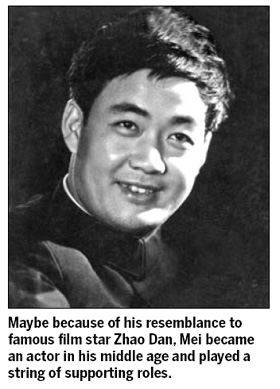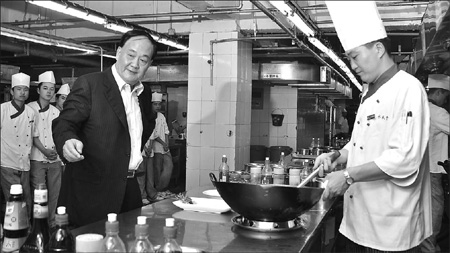In his natural element
|
Mei Runshen discusses with his chefs ways to improve the cuisine in one of his restaurants. photos provided to China Daily |

Suzhou's famed restaurateur is a legend with a more storied past than any 'gourmet' movie could imagine, finds Raymond Zhou
Mei Runshen's life is closely associated with one basic element of nature ?water. The first eatery he opened in Suzhou was a teahouse with a meandering stream and a matching corridor. After you paid 48 yuan, you could sip tea and savor a rich array of local delicacies for a whole day. Business boomed.
That was 2000. He named this Chinese equivalent of a caf or deli Water Paradise. Now you can hardly walk for a mile in Suzhou without encountering a diner with that name. Mei has 23 restaurants and seven hotels under that brand, located all across one of the "Twin Paradises Under Heaven", as Suzhou is widely known (the other being Hangzhou) and scattered in neighboring cities in Eastern China's Jiangsu province.
If one has been in a 20-year coma like Rip Van Winkle and just woken up, one may feel that the name Water Paradise rings a bell. Water Crystal Palace was a big-name establishment back in the 1980s. It was not exactly a restaurant, but more like a cabaret-style venue. Mei was not its owner, but its general manager. He was the talk of the town, playing host to a revolving door of big-name entertainment celebrities.
Unlike many successful restaurateurs, Mei did not graduate from the position of master chef. He literally grew up on a river. When he was 18, he joined the crew of a steamboat that crawled along the Suzhou-Hangzhou canal. A one-way trip could take 17 hours. It was not the most exciting job in the world, but he made the best of it and rose all the way to captain. He even met the love of his life along this watery route.
Come reform and opening up, many people "plunged into the sea", so to speak, giving up their lifetime job for an opportunity for entrepreneurship. Mei, on the contrary, stepped ashore, only to dip his toes in a pond that posed an almost fatal attraction: He became an actor. By pure coincidence, he was cast in a string of movies and television shows. When he was a youth, he had a striking resemblance to Zhao Dan, one of China's most celebrated film actors from the early years; and when he was older, he could pass for a Chairman Mao impersonator. But at that particular stage of his life, he was exclusively offered roles as bad guys.
His eight roles did not make him a star, yet whetted his appetite for the world of entertainment, which, unknown to him, was going to be his oyster pretty soon. By 1984, he was the Suzhou distributor for China Record Co. There were eight such dealers nationwide. His was the smallest, not even based in a provincial capital city. But he knew there was a huge potential market for cassettes of popular music, even if he did not have many resources. He decided to license albums from some overseas Chinese singers - singers with memorable melodies but without big names. It turned out they sold like hot cakes, to the tune of 8-10 million tapes a year, which made him the champion distributor in the whole country for five consecutive years.
Another business idea was an album titled The Red Sun. It was a compilation of "cultural revolution"-era tunes, but with a twist. The musical accompaniment was updated and the singing was more pop than strident. This was a runaway hit with 800,000 copies sold, "We played to people's nostalgia and fused the old and the new," Mei explained.
But his days being flanked by pop idols and showgirls did not intoxicate Mei. He knew they would not last, he was working under the constraints of a State-owned business. Things could change overnight, he figured.
Instead of letting changes happen to him, he took the initiative and cut his ties to the old system. He disappeared from the commotion of the mid-1990s' Suzhou scene. Rumors spread that he turned into a Taoist recluse and hid himself in a mountain. Actually he flew to New York and started exploring the city. An acute observer, he noticed many things, such as the special flavor of Chinese food in Chinatown restaurants. It was not authentic, yet American patrons loved it.
Life in the US was humdrum for someone used to being toasted all the time. But Mei viewed it as his MBA education. He was constantly looking around and asking questions. When he returned to his hometown at the new millennium, he emanated the same confidence as before but with a new sophistication.
"I wanted to open restaurants that were Western in style but Chinese at heart," he said. While in the US, he tasted steaks in all stages of ripeness - rare, medium and well-done. "We cannot serve rare. All steaks have to be 70 percent cooked at least. We Chinese simply cannot accept the sight of blood on our food."
It was this kind of understanding of cultural nuances that made his reemergence in the town with its fast burgeoning middle class one to savor. "Boss Mei is back!" people whispered, "and he is bigger than ever."
Mei still hosts top stars, such as Xiao Shenyang and Chen Liu (aka Liu Qian), but the non-stop parading of them has been frozen in photo albums and memories. "Nowadays when I travel to Beijing, I meet only a few old friends, mostly behind-the-scene people."
When asked if he is ready for a movie based on his life, he laughed: "I have been through more than any of those gastronomy-themed movies can impart, movies like Eat Drink Man Woman. My life is a microcosm of the rise of China."
Mei did not give a direct answer, but it seems he relishes the idea. Although his restaurants are favorites with big parties, he limits his socializing to the minimum. Rather, he spends his time studying recipes and improving the menu. "I'm not a chef by profession, but I'm a very good cook," he admits.
Mei also hones his management ideas: "There are three types of stuff a business can sell: The best sells standards; the second tier sells management; and the third tier sells products." The pile of applications for franchising on his desk attests to the shifting of Water Paradise from selling products to selling standards.
Back at home, an old-style abode tucked away from a bustling street of old town, he sips tea in his grand living room with pillars and a slab floor, or out in the pavilion. The garden, a reproduction of Suzhou architecture, has a pond.
"I'm nourished by the Suzhou water," Mei said, adding, "Have you tried our soup? It's the best."
(China Daily 06/12/2010 page11)















